Mary Anne Yarde's Blog: The Coffee Pot Book Club , page 139
May 10, 2019
Book Review — Wyvern of Wessex (Sons of Kings #3) by Millie Thom #HistoricalFiction #Vikings #AngloSaxon @MillieThom
 Wyvern of Wessex(Sons of Kings #3)By Millie Thom
Wyvern of Wessex(Sons of Kings #3)By Millie Thom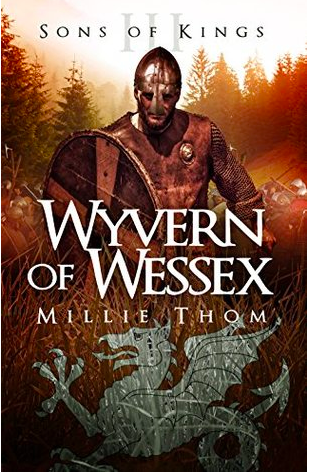
Eadwulf is back in the Sea Eagle with Bjorn and his crew in a quest to discover if Eadwulf’s father, King Beorhtwulf of Mercia, is still alive after twenty years as a slave. Bjorn’s great dragonship carries them down to the searing June temperatures and strict laws in the Moorish lands of al-Andalus. But searching for Beorhtwulf proves more difficult than they’d expected, causing them more trouble than they bargained for…
In Wessex, King Aethelred is now dead, leaving his twenty-one-year-old-brother, Alfred, to succeed to the throne. Though his succession was agreed by the witan, Alfred must now prove himself worthy of the kingship, or lose it. But Wessex is in turmoil, besieged by Viking Danes intent on subjugating the kingdom – and knowing that the new king is young and inexperienced. Alfred must use all his wiles if he is to outthink and outmanoeuvre Guthrum, the Dane who nearly becomes his nemesis.
Alfred’s victories and defeats take him on a journey of learning, during which he gains experience and strength. We share his highs and his lows and how he rises from the depths of despair to save his beloved kingdom from total conquest.
And at his side at his greatest time of need, is his new ally and friend, Eadwulf of Mercia.

“I have just one piece of advice for you, Alfred of Wessex… Surrender!”
On a grassy plain, thirty miles west of Winchester, Alfred’s army finds themselves face-to-face with the newly arrived Norse Summer Army led by Halfdan, son of the late Ragnar Lothbrok. To his dismay, Alfred soon realises that the Norse Army is far better equipped than he could ever hope that his army would be. The Norse are wearing mail byrnie and metal helms, whereas in Alfred’s army only the nobles wear such armour, and there is a blood lust in the Norsemen’s eyes which would have put the fear of God into even the bravest of Saxon men. However, it was said that no one could tell the difference between a brave man and one who is pretending. The Norse Army may well be intimidating, but Alfred will not let them see that he is intimidated. He is the King of Wessex, and he will lead his men bravely into battle, even if it is God’s will that the crown of Wessex would not be his to wear for much longer.
When a trusted kinsman turned traitor, Eadwulf of Mercia’s life was irrevocably changed forever. Eadwulf had been just a boy when he was sold into slavery at a Norse market. From there on in he had been brought up as a Dane. He had eventually been given his freedom by Ragnar’s eldest son, Bjorn Ironside.
It had been twelve years since last Eadwulf had sailed in a longship, and he would not be doing so now if he had not heard a whispered rumour that his father, Beorthwulf, the former King of Mercia was still alive. But 20 years is a long time, and if he had survived, what kind of broken man would he be? For foreign slaves are bought to al-Andalus to be of use in the service of Emir Muhammad, where they will spend what is left of this life in the mines or the quarries. It is a forlorn hope, but Eadwulf must discover the truth. One way or the other…
Millie Thom has once again given us an evocative and utterly compelling story of one man’s fight for his people, his kingdom and his throne. Wyvern of Wessex: Sons of King #3 was everything I wanted it to be and then some.
This is very much the story of Alfred the Great and how he came to deserve the name that was bestowed on him by others. In Thom’s adaptation, Alfred is a truly human hero, who makes mistakes that cost him many sleepless nights. Initially, Alfred is trustingly optimistic, but he soon learns that an oath, given by a victorious enemy, is worth very little, and a treaty of peace is worth even less. But Alfred is a quick study, and the mistakes he makes are not to be repeated. His ability to turn disaster into success and his dogged determination to never give up made him not only a likeable character but one in which it was easy to understand why men risked their lives to follow him, even when the odds were not in their favour.
Likewise, Eadwulf’s character continued to develop throughout this book. Eadwulf's journey, from a young fearful child to a warrior has been compellingly enthralling, and although for me in this book, I felt Alfred took centre stage, I still enjoyed reading about Eadwulf and the life he had made for himself and his family.
In the first two books, several of the antagonists are the sons of Ragnar Lothbrok. But with the death of Ivar, Halfdan now longs for domestic pleasures away from the battlefield. Guthrum happily steps into Halfdan’s shoes and leads the Norse Army. Thom has paid close attention to the historical detailing of this time and this historical character. I thought her depiction of Guthrum was spot on. He is cruel and ruthless in his determination to snatch Wessex away from Alfred. And although he comes across at times as unscrupulous and untrustworthy, his respect for Alfred is genuine. He soon learns that Alfred is a formidable foe and one to be taken extremely seriously. His characterisation certainly drove this story forward, and although I did not like him all that much, I thought his portrayal was fabulous!
In amongst the brutal strife are moments of simple domestic pleasure — a good fire, fresh bread, the joy of catching a fish for the first time. Thom has carefully balanced the savageness of warfare with everyday activities, which gave the story some much deserved moments of peace and it also reminded the reader what Alfred was fighting for.
Thom’s compelling narrative has to be commended. From the dampness and lushness of the grass to the treacherous marshes in Somerset, Thom pays attention to the little things which give this novel not only credibility but a sense of realism. Not many authors can adequately pull this off, but Thom has.
I have to mention the battles, for there are several. Thom has an intuitive knowledge of what to leave in, what to leave out, and what to leave to the readers’ imagination. The battle scenes are epic, but at the same time, Thom does not write pages and pages of continuous violence. Instead, Thom concentrates on the emotion — Alfred's fear, his despair, and his fatigue make these scenes utterly irresistible.
If you are looking for a series that contains a finely balanced mix of love, patriotism and treachery then Wyvern of Wessex: Sons of King #3 is for you. Although Wyvern of Wessex is book 3 in the series, it does work well as a standalone, but considering what happens in the first two books it would be a shame to miss out on the story of Alfred’s life.
I Highly Recommend.
Review by Mary Anne Yarde.The Coffee Pot Book Club.
Pick up your copy of Wyvern of Wessex(Sons of Kings #3)Amazon UK • Amazon US
Millie Thom
 Millie Thom is a former geography and history teacher with a degree in geology and a particular passion for the Anglo-Saxon and Viking period. Originally from Lancashire she is a mother of six grown up children and now lives with her husband in a small village in Nottinghamshire, midway between the town of Newark and the lovely old city of Lincoln. When not writing, Millie enjoys long walks and is a serious fossil hunter. She is also an avid traveller, swimmer and baker of cakes!
Millie Thom is a former geography and history teacher with a degree in geology and a particular passion for the Anglo-Saxon and Viking period. Originally from Lancashire she is a mother of six grown up children and now lives with her husband in a small village in Nottinghamshire, midway between the town of Newark and the lovely old city of Lincoln. When not writing, Millie enjoys long walks and is a serious fossil hunter. She is also an avid traveller, swimmer and baker of cakes!Connect with Millie : Website • Twitter
Published on May 10, 2019 22:30
May 9, 2019
Have you heard? Kathleen Shoop is giving away a copy of her fabulous book — The Strongman and the Mermaid — as well as a $50 Amazon Gift Card! #Giveaway @kathieshoop @hfvbt
Lukasz pushed his friend’s hand away, thinking of the mermaid he’d been dreaming of for months. If only a real woman came to him as often. “You either.”
Giveaway
During the Blog Tour, we will be giving away a copy of The Strongman and the Mermaid and a $50 Amazon Gift Card! You can enter HERE!
Giveaway Rules
• Giveaway ends at 11:59 pm EST on May 22nd. You must be 18 or older to enter.
• Giveaway is open INTERNATIONALLY.
• Only one entry per household.
• All giveaway entrants agree to be honest and not cheat the systems; any suspicion of fraud is decided upon by blog/site owner and the sponsor, and entrants may be disqualified at our discretion.
• The winner has 48 hours to claim prize or new winner is chosen.
Pick up your copy ofThe Strongman and the MermaidAmazon
Kathleen Shoop
 Bestselling author, Kathleen Shoop, holds a PhD in reading education and has more than 20 years of experience in the classroom. She writes historical fiction, women’s fiction and romance. Shoop’s novels have garnered various awards in the Independent Publisher Book Awards, Eric Hoffer Book Awards, Indie Excellence Awards, Next Generation Indie Book Awards and the San Francisco Book Festival. Kathleen has been featured in USA Today and the Writer’s Guide to 2013. Her work has appeared in The Tribune-Review, four Chicken Soup for the Soul books and Pittsburgh Parent magazine. She lives in Oakmont, Pennsylvania with her husband and two children.
Bestselling author, Kathleen Shoop, holds a PhD in reading education and has more than 20 years of experience in the classroom. She writes historical fiction, women’s fiction and romance. Shoop’s novels have garnered various awards in the Independent Publisher Book Awards, Eric Hoffer Book Awards, Indie Excellence Awards, Next Generation Indie Book Awards and the San Francisco Book Festival. Kathleen has been featured in USA Today and the Writer’s Guide to 2013. Her work has appeared in The Tribune-Review, four Chicken Soup for the Soul books and Pittsburgh Parent magazine. She lives in Oakmont, Pennsylvania with her husband and two children.Connect with Kathleen:WEBSITE • FACEBOOK • TWITTER • GOODREADS • PINTEREST • BOOKBUB

Published on May 09, 2019 23:00
Have you heard? Historical Fiction author, Cryssa Bazos, has a new book coming out! Check out the cover of – Severed Knot #CoverReveal #NewRelease @CryssaBazos
Severed KnotBy Cryssa Bazos

Barbados 1652. In the aftermath of the English Civil War, the vanquished are uprooted and scattered to the ends of the earth.
When marauding English soldiers descend on Mairead O’Coneill’s family farm, she is sold into slavery. After surviving a harrowing voyage, the young Irish woman is auctioned off to a Barbados sugar plantation where she is thrust into a hostile world of depravation and heartbreak. Though stripped of her freedom, Mairead refuses to surrender her dignity.
Scottish prisoner of war Iain Johnstone has descended into hell. Under a blazing sun thousands of miles from home, he endures forced indentured labour in the unforgiving cane fields. As Iain plots his escape to save his men, his loyalties are tested by his yearning for Mairead and his desire to protect her.
With their future stolen, Mairead and Iain discover passion and freedom in each other’s arms. Until one fateful night, a dramatic chain of events turns them into fugitives.
Together they fight to survive; together they are determined to escape.
Excerpt
The song ended, and Iain watched Alastair as he entered the crushing mill. He disappeared for a moment, and when he reappeared, he cradled a violin in the crook of his arm.
Iain couldn’t sit there any longer. Passing by the keg, he dropped the cup on top and manoeuvred through the crowd to head back to his hut.
Tam stopped him. “Where are you off to, Scotsman? You’re truly sour, man.”
“I’ve had enough.” Iain patted the man on the shoulder and attempted to move past him. Before he did, he glanced to the crushing mill in time to see Alastair handing the violin to Mairead. The rapt expression on her face made Iain pause. She handled the instrument reverently, as carefully as a woman cradling her bairn. Iain had never seen her eyes so round, her normally wary expression soft.
Mairead lifted the violin to her collarbone and adjusted her grip. She tried a few tentative plucks and adjusted the tuning until the chord sounded right. She lifted the bow against the strings and started to play.
The sound that came from her violin was low, wistful and with a melody that stirred long-buried hopes. Both light and dark notes rounded each other out as she pushed the tune farther along. A low drumbeat joined in, and she adjusted her rhythm slightly to hit the rising notes with the downbeat.
Then the main melody started.
Iain knew this song. An old Scottish ballad, one of his favourites. It called to mind the longing of home. It had been the song that he had sung to himself during the gruelling journey from England.
How was it that she stood there playing that very song?
The melody had always stirred him, providing comfort during all those times he had been away on campaign, far from home. But Mairead’s rendition added layers he had never heard. The mournful tone of the violin spoke of the wind in the firs and smoky twilight clinging to the mountains. A flight of swallows darting in a cold twilight sky and the cry of terns riding a lonely sea breeze. It called to memory swiftly flowing burns bordered with purple heather, and the hope of love reunited.
As she played, the lyrics flowed through his mind: An’ what will be the love-tokens that ye will send wi me . . . A kiss, aye, will I twae an’ ever she come to fair Scotland . . . I the red gold she sall gae . . .
Iain felt it deep in his bones. Each note ripped through his defences, stone and mortar. Everything melted away. He forgot the crowd, forgot his situation and the harshness of the sugarcane fields. Only Mairead and her song remained.
He moved closer to the platform. Mairead stood several feet away, her eyes closed and head tilted sideways. Her lashes fanned her flushed cheeks, and her mouth was slightly parted. At times, a smile flitted across her lips, while at others her brow puckered into a frown, but always her expression remained enraptured. He watched, fascinated, as the bow danced over the strings, directed by nimble fingers.
Iain hung on every note as though it were the last. Good, sweet Lord, he didn’t want it to end.
The song finally ended, and Mairead drew her last pass with the bow. Her hand stilled, and her shoulders went limp. A single tear traced down her cheek. When she opened her eyes, her unfocused gaze found his, and the look shot right through him.
Around Iain, men whistled and clapped, not realising that the earth had just shifted.
Pre-order your copy of Severed KnotAmazon • Books2Read
Cryssa Bazos
 Cryssa Bazos is an award-winning historical fiction author and 17th-century enthusiast with a particular interest in the English Civil War. She is a member of the Historical Novel Society, the Romantic Novelist Association and is a co-editor and contributor of the English Historical Fiction Authors blog. Her debut novel, Traitor's Knot, is published by Endeavour Media. Traitor's Knot is the Medalist winner of the 2017 New Apple Award (historical fiction), a finalist for the 2018 EPIC eBook Awards (historical romance) and the RNA Joan Hessayon Award. Her second novel, Severed Knot, was longlisted for the Historical Novel Society 2018 New Novel Award.
Cryssa Bazos is an award-winning historical fiction author and 17th-century enthusiast with a particular interest in the English Civil War. She is a member of the Historical Novel Society, the Romantic Novelist Association and is a co-editor and contributor of the English Historical Fiction Authors blog. Her debut novel, Traitor's Knot, is published by Endeavour Media. Traitor's Knot is the Medalist winner of the 2017 New Apple Award (historical fiction), a finalist for the 2018 EPIC eBook Awards (historical romance) and the RNA Joan Hessayon Award. Her second novel, Severed Knot, was longlisted for the Historical Novel Society 2018 New Novel Award. Connect with Cryssa: Website• News Letter Sign-Up • Facebook • Twitter • Instagram.
Published on May 09, 2019 22:00
May 8, 2019
Join Historical Fiction author, Tim Walker, as he takes a look at Life and Death in the Early Dark Ages #History #DarkAges @timwalker1666
Life and Death in Early Dark Ages BritainBy Tim WalkerMy fascination for this relatively unknown period in British history wedged between the end of Roman occupation and the establishment of the Anglo-Saxon kingdoms - the early Dark Ages - started on a summer's day in 2015. I was standing in a field surrounded by the jagged stubble of a stone wall, pillaged over the years, but now partly restored and proudly maintained by English Heritage. The Romans called it Calleva Atrebatum, literally 'the wooded place of the Atrebates', and by naming it for the local tribe, showed a desire to placate their new subjects.
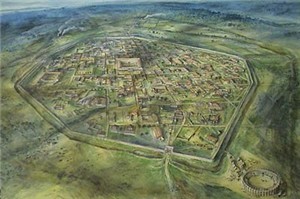 Calleva Atrebatum aerial artist impression.
Calleva Atrebatum aerial artist impression.It was the site of a Roman town that had been completely abandoned within a hundred-or-so years following the Roman evacuation around the year 410 AD, now under investigation by a team of archaeologists from Reading University. This mysterious desertion raises the question, ‘why was it abandoned? The earliest surviving source from this period, Gildas (‘On the Ruin of Britain’ c. 540AD) gives us a clue. Gildas speaks of a time of great suffering and persecution of the people from invaders, forcing them to flee settlements and coastal areas prone to being raided for the old hill forts that archaeologists confirm were re-occupied in this period.

I began researching and writing a novella, Abandoned, that became the starting point of a series that has led me into the Arthurian legend, and to my own tentative telling of the King Arthur story based on literary and historical research. A Light in the Dark Ages reflects my fascination with this little-known period in our fractured history - an intriguing stage on a continuum of passive and violent invasions that have shaped the British nation.Nennius (The History of the Britons c. 830) mentions Arthur and gives us a list of his twelve battles. He tells us that the Kingdom of Kent was ruled by a Saxon king, Octha, the son of Hengist, and Arthur rallied the combined forces of the Kings of the Britons to oppose him. Nennius refers to Arthur not as a king, but as ‘Dux Bellorum’ – Duke, or leader, of Battles. He doesn’t say that Arthur was not one of the kings of the Britons, merely that he was their military commander, and perhaps the first amongst equals.Other mentions for Arthur occur in The Mabinogion, a collection of early Welsh folk tales that locates King Arthur at the former Roman Legion town of Isca Augusta, now called Caerleon, in South Wales. Arthur and other Briton leaders had plenty on their minds with tribes from Scotland raiding the north, the Irish raiding and occupying parts of the west, Germanic and Danish tribes - the Angles, Saxons and Jutes, raiding and colonising the east and south, and ongoing struggles for supremacy with rival tribal chiefs.In my storytelling I have adopted the lineage of high kings of Britain (ruling over regional tribal kings and chiefs) proposed by the much-discredited Geoffrey of Monmouth in his epic work, The History of the Kings of Britain c. 1136. The elements of his work that are based on historical research and a claimed ‘lost book in a local tongue’, have been undermined in the eyes of historians by his habit of supplementing fact with legend, mythology or fiction. This is far from conclusive, although Vortigern, Ambrosius Aurelianus and Arthur get mentions in other historical sources to add a tantalising element of the possible to Geoffrey’s timeline of kings:Constantine c. 411 – 420Vortigern c. 420 – 440Ambrosius Aurelianus c. 440 – 470Uther Pendragon c. 470 – 485Arthur c. 485 – 530
What really happened in Britain after the end of Roman occupation around the year 410 AD? Scant evidence remains, although archaeological excavations still uncover artefacts that give a glimpse of habitat, lifestyle and death ritual. The lack of evidence of battle sites that can be dated to the fifth and sixth centuries has been seized upon by some revisionist historians to suggest that the Anglo-Saxon colonisation was a relatively peaceful affair. This seems unlikely to me, and until firmer evidence is forthcoming there will be much speculation and plenty of imagined offerings from historical fiction authors.
A Light in the Dark Ages

Pick up your copy of
A Light in the Dark Ages series Amazon UK • Amazon US

Tim Walker
 Tim Walker is an independent author based in the UK.His latest book is 'Arthur, Dux Bellorum', a re-imagining of the King Arthur story, published in March 2019. Book four in his historical series, 'A Light in the Dark Ages', it has won two book awards in April 2019 - One Stop Fiction Book of the Month and the Coffee Pot Book Club Book Award. He plans to write a second Arthur book for 2020 publication.Book one is 'Abandoned' (second edition 2018), followed by 'Ambrosius: Last of the Romans' (2017), and book three is 'Uther's Destiny' (2018). Series book covers are designed by Canadian graphic artist, Cathy Walker. The aim of A Light in the Dark Ages book series is to connect the end of Roman Britain to elements of the Arthurian legend, through researched history, presenting an imagined/alternative history of Britain in the early Dark Ages.Tim lives near Windsor - close to the River Thames - the inspiration for his first book of short stories, 'Thames Valley Tales' (2015). In September 2017 he published a second book of short stories, 'Postcards from London'. These stories draw on the local history and current affairs of these places where the author has lived and worked.His first novel was a political thriller, 'Devil Gate Dawn', that received pre-publication exposure on the Kindle Scout programme in March/April 2016. It found a wide readership due to its unnerving predictions of a post-Brexit Britain beset by political turmoil under King Charles III's rule and buckling under attacks from terrorist groups - and a dystopian portrayal of life in Trump America.In early 2017 he published his first children's book, co-authored with his daughter, Cathy - 'The Adventures of Charly Holmes'. Another adventure story was published in 2018 - 'Charly & The Superheroes'. Rumour has it that a third adventure will be coming out later in 2019.Connect with Tim: Website • Newsletter sign-up • Amazon • Facebook • Twitter.
Tim Walker is an independent author based in the UK.His latest book is 'Arthur, Dux Bellorum', a re-imagining of the King Arthur story, published in March 2019. Book four in his historical series, 'A Light in the Dark Ages', it has won two book awards in April 2019 - One Stop Fiction Book of the Month and the Coffee Pot Book Club Book Award. He plans to write a second Arthur book for 2020 publication.Book one is 'Abandoned' (second edition 2018), followed by 'Ambrosius: Last of the Romans' (2017), and book three is 'Uther's Destiny' (2018). Series book covers are designed by Canadian graphic artist, Cathy Walker. The aim of A Light in the Dark Ages book series is to connect the end of Roman Britain to elements of the Arthurian legend, through researched history, presenting an imagined/alternative history of Britain in the early Dark Ages.Tim lives near Windsor - close to the River Thames - the inspiration for his first book of short stories, 'Thames Valley Tales' (2015). In September 2017 he published a second book of short stories, 'Postcards from London'. These stories draw on the local history and current affairs of these places where the author has lived and worked.His first novel was a political thriller, 'Devil Gate Dawn', that received pre-publication exposure on the Kindle Scout programme in March/April 2016. It found a wide readership due to its unnerving predictions of a post-Brexit Britain beset by political turmoil under King Charles III's rule and buckling under attacks from terrorist groups - and a dystopian portrayal of life in Trump America.In early 2017 he published his first children's book, co-authored with his daughter, Cathy - 'The Adventures of Charly Holmes'. Another adventure story was published in 2018 - 'Charly & The Superheroes'. Rumour has it that a third adventure will be coming out later in 2019.Connect with Tim: Website • Newsletter sign-up • Amazon • Facebook • Twitter.
Published on May 08, 2019 23:00
May 7, 2019
Join #HistoricalFiction author, Robert L. Barclay, as he talks about the challenges that come with writing about the moon #amwriting
The challenges that come with writing about the moon.By Robert L. Barclay
 Photo by Neven Krcmarek on Unsplash
Photo by Neven Krcmarek on UnsplashThe moon is one of our most powerful natural symbols, and we all use it to set our scenes. But, like everything else in the natural world, the moon obeys the immutable laws of the universe, so we should treat it with respect.
Even well-known professional authors forget that plausibility does not cease at the edge of the atmosphere. For example, and internationally acclaimed author and winner of prestigious awards writes that “a crescent moon was rising in the west.” Impossible: as the Earth rotates, all celestial objects, including the moon, set in the west. The crescent moon rises in the east before dawn. Another writer describes her protagonist walking out to the ice rink late at night, lit only by the thinnest crescent moon. Again, not possible: a new moon will have long since set; the scene could only be illuminated by a waxing moon, half or greater.
“The full moon, amid a field of a billion stars, lit the scene as bright as day,” writes a prize-winning author. However, when the moon is full and high its glare washes out the stars. Only the brightest of stars can be discerned at the full moon. One can have a billion stars, or one can have a brilliant full moon, but not both.
I have read of a full moon floating high in the sky at sunset, when orbits dictate that as the sun sets in the west, so the moon rises in the east. One must also be careful about the passing of time. In one classic novel, a raft passing down a river is lit by a full moon, while the very next day the moon has become a crescent. Such inattention to detail causes the reader to question the plausibility of the entire world the author has created, so let’s try to avoid opening fissures in our narrative by ignoring the operation of the orbs.
Jacob the Trumpeter

My name is Jacob Hintze. I may be an innkeeper now, but I will always be a trumpeter. That was my profession for a good portion of my fifty-two years. Fifty-two isn't a bad age to get to when you think of the total shit storm of the Thirty Years' War, especially if you were right in the middle of it as I was, watching your comrades being blown to pieces around you. But sounding signals on the battlefield isn't the half of what I was called to do. You see, you don't see a duke giving a lowly cavalry trumpeter like me the living of an inn on the post road unless he's done something special to earn it. And earn it I did; musician, courier, emissary, spy, those are the things I did for my duke, and more besides. And now it's time to write it all down. When you're under a sentence of death, as I now am, it makes you want to tell your story and I just hope I can get it done before it's too late.
Pick up your copy of Jacob the Trumpeter
Barnes and Noble

Robert L. Barclay
Robert L. Barclay has published four novels through his independent publishing company, Loose Cannon Press. He conducts trumpet-making workshops in Europe and the United States, and it was while teaching in Germany that the theme for his current novel arose. The chance discovery of a 17th century trumpet hanging in a small Lutheran church resulted in Jacob the Trumpeter, the ‘biography’ of the instrument’s owner, which is all true, or at least it really ought to be!
Connect with Robert: Website
Published on May 07, 2019 23:00
Have you heard? Historical Fiction author, Mimi Matthews, is giving away two signed copies of her fabulous book — A Modest Independence #Giveaway #HFVBTBlogTours @MimiMatthewsAuthor @hfvbt
Historical Fiction Virtual Blog Tours Presents…
A Modest IndependenceBy Mimi Matthews

He Needed Peace…Attorney Tom Finchley has spent his life using his devious intellect to solve the problems of others. As for his own problems, they’re nothing that a bit of calculated vengeance can’t remedy. But that’s all over now. He’s finally ready to put the past behind him and settle down to a quiet, uncomplicated life. If only he could find an equally uncomplicated woman.She Wanted Adventure…Former lady’s companion Jenny Holloway has just been given a modest independence. Now, all she wants is a bit of adventure. A chance to see the world and experience life far outside the restrictive limits of Victorian England. If she can discover the fate of the missing Earl of Castleton while she’s at it, so much the better.From the gaslit streets of London to the lush tea gardens of colonial India, Jenny and Tom embark on an epic quest—and an equally epic romance. But even at the farthest edges of the British Empire, the past has a way of catching up with you…
Excerpt
From Chapter 4
It was only a short distance to the pier. When they arrived, they were greeted by the prospect of a churning sea. A handful of travelers were gathered on the dock, all of them bundled up against the frigid weather.
Tom disembarked first. “Careful. Mind the step.”
Jenny clung to his hand as she stepped down from the carriage. The wind whipped at her skirts and at the ribbons of her bonnet. It was cold as ice, biting at her face and stinging her eyes. After months of living on the North Devon coast with Helena and Mr. Thornhill, she was accustomed to the smell of sea air and the peculiar force of the wind as it blew in from over the water. But like everything else, this was different. The beach at Greyfriar’s Abbey was isolated. Lonely. Dover, by contrast, was teeming with industry.
A steamer ship was docked in the harbor, near to where the crowd of people were gathered. Men in rough coats and wool trousers moved up and down a narrow wooden gangplank, loading the ship with crates, leather cases, and great waterproof trunks like Jenny’s.
“The Onyx,” she said. “That’s my ship, isn’t it?”
Tom stood close at her side. “It is.” He cast her a look. “Scared?”
“No.”
The carriage was stopped behind them, the driver hunched over on the box. He likely couldn’t hear them over the wind. And he certainly didn’t seem interested in what it was they were saying or doing.
Gathering her courage, Jenny turned to face Tom. “Please don’t walk me to the ship,” she said in a rush. “I’d rather say goodbye to you here.”
Tom’s expression was guarded. Almost unreadable. He cleared his throat. “As to that—”“Please. I don’t think I could bear it if you were to stand on the dock waving me off. It’s difficult enough as it is.”
“Why should it be difficult?”
“I don’t know.” The wind blew the silk ribbon ties of her bonnet across her mouth. She brushed them away. “You and I are a puzzle, aren’t we? To me, anyway. I’ve resolved to chalk it up to one of those unfortunate pangs that we discussed last evening.”
Tom gave her an arrested look. “Longing, do you mean?”
“Yes. I suppose that’s it.”
“For me?”
She flushed. “Why not?” And then, before she could talk herself out of it, she stood up on the toes of her boots and pressed a kiss to his cheek. “Goodbye, Tom. Perhaps, someday—if you ever have the inclination—you might write to me in India.”
Tom stared down at her, his Adam’s apple bobbing on a swallow. When at last he replied, his voice was deeper than usual. “I won’t be writing to you, Jenny.”
Her stomach dropped. “Oh.” She took a step back from him. A surge of embarrassment clogged her throat, making it difficult to speak. “Yes, of course. I perfectly understand.”
“No, you don’t. There won’t be any need to write because…I’m coming with you.”
Giveaway
During the Blog Tour, we have two signed copies of A Modest Independence up for grabs! You can enter the competition HERE!Giveaway Rules
• Giveaway ends at 11:59 pm EST on May 10th. You must be 18 or older to enter.• Giveaway is open to US residents only.• Only one entry per household.• All giveaway entrants agree to be honest and not cheat the systems; any suspicion of fraud is decided upon by blog/site owner and the sponsor, and entrants may be disqualified at our discretion.• The winner has 48 hours to claim prize or new winner is chosen.
Pick up your copy ofA Modest IndependenceAMAZON BARNES AND NOBLE ITUNES KOBO
Mimi Matthews
 USA Today bestselling author Mimi Matthews (A Victorian Lady’s Guide to Fashion and Beauty, The Matrimonial Advertisement) writes both historical non-fiction and traditional historical romances set in Victorian England. Her articles on nineteenth century history have been published on various academic and history sites, including the Victorian Web and the Journal of Victorian Culture, and are also syndicated weekly at BUST Magazine. In her other life, Mimi is an attorney. She resides in California with her family, which includes an Andalusian dressage horse, two Shelties, and two Siamese cats.
USA Today bestselling author Mimi Matthews (A Victorian Lady’s Guide to Fashion and Beauty, The Matrimonial Advertisement) writes both historical non-fiction and traditional historical romances set in Victorian England. Her articles on nineteenth century history have been published on various academic and history sites, including the Victorian Web and the Journal of Victorian Culture, and are also syndicated weekly at BUST Magazine. In her other life, Mimi is an attorney. She resides in California with her family, which includes an Andalusian dressage horse, two Shelties, and two Siamese cats.Connec with Mimi: Facebook • Twitter • BookBub • Pinterest • Goodreads.

Published on May 07, 2019 21:30
May 6, 2019
Join #HistoricalFiction author, Tony Riches as he explores the stories of the Tudors #Tudors #mustread @tonyriches
Telling the Stories of the TudorsBy Tony Riches
 It began with my research for a novel about the life of Henry Tudor, who like me was born in the Welsh town of Pembroke. I decided to write it as an historical fiction novel in the hope of reaching a wider audience, including those who might never read a text book about the Tudors. I also enjoy the challenge of ‘filling the gaps’ in the historical record, and bringing these men and women to life.
It began with my research for a novel about the life of Henry Tudor, who like me was born in the Welsh town of Pembroke. I decided to write it as an historical fiction novel in the hope of reaching a wider audience, including those who might never read a text book about the Tudors. I also enjoy the challenge of ‘filling the gaps’ in the historical record, and bringing these men and women to life.I’d collected more than enough material for a book – and discovered that although Henry features (with varying degrees of accuracy) in many works of fiction, there were no novels devoted to telling his amazing story. I believe this was partly because Henry had been labelled as dull and miserly, when in fact he was an extravagant gambler, who spent a fortune on clothes, knew how to broker peace and brought an end to the Wars of the Roses.
I also discovered there were no novels about Henry’s Welsh grandfather, Owen Tudor, or Owen’s son, Jasper Tudor, who helped Henry become king. The Tudor trilogy provided the perfect ‘vehicle’ for Henry to be born in the first book, ‘come of age’ in the second, and become King of England in the third.
I’m pleased to say the books of the Tudor trilogy became best sellers in the US, UK and Australia, with the final book being the only historical fiction novel shortlisted for the Amazon Kindle Storyteller award. (Henry was a runner up but I won a Kindle Oasis and a bottle of good Champagne.)
The challenge I then faced was how to follow a successful trilogy. I’d enjoyed developing the character of Henry’s daughter, Mary Tudor, and realised the story of how she became Queen of France is little known. (In the TV series ‘The Tudors’ Mary was ‘merged’ with her sister Margaret – and some people understandably confuse her with her brother’s daughter, also Mary Tudor.)
I wrote Mary – Tudor Princess, which become my best-selling book last year, then followed up with my latest book, Brandon – Tudor Knight. Readers are probably familiar with Charles Brandon’s story of how he risked everything to marry Mary Tudor against the wishes of her vengeful brother, Henry VIII. What they might not know is how Brandon found himself seriously out of his depth fighting Henry’s wars in France, or that after Mary’s death he married his fourteen-year-old ward, wealthy heiress Lady Katherine Willoughby.
Now I have two ‘sequels’ to the Tudor Trilogy, with the five books forming a series providing a continuous narrative throughout the reign of the two King Henrys. Where to go next? All the books are now available as audiobooks, and are being translated into Spanish and Italian. I’ve also been recording podcasts about the stories of the Tudors each month, (see https://tonyriches.podbean.com/.)
I’m now enjoying researching and writing the amazing story of what became of Katherine (Willoughby) Brandon after the death of Charles. Her story deserves to be told – and leads right up to the coronation of Queen Elizabeth I and my planned next series, which will explore the fascinating world of the Elizabethan Tudors.
Brandon – Tudor KnightBy Tony Riches

From the author of the international bestselling Tudor Trilogy comes a true story of adventure, courtly love and chivalric loyalty.
Handsome, charismatic and a champion jouster, Sir Charles Brandon is the epitome of a Tudor Knight. A favourite of King Henry VIII, Brandon has a secret. He has fallen in love with Henry’s sister, Mary Tudor, the beautiful widowed Queen of France, and risks everything to marry her without the King’s consent.
Brandon becomes Duke of Suffolk, but his loyalty is tested fighting Henry’s wars in France. Mary’s public support for Queen Catherine of Aragon brings Brandon into dangerous conflict with the ambitious Boleyn family and the king’s new right-hand man, Thomas Cromwell.
Torn between duty to his family and loyalty to the king, Brandon faces an impossible decision: can he accept Anne Boleyn as his new queen?
Pick up your copy of Brandon – Tudor KnightAmazon UK • Amazon US
Tony Riches
 Tony Riches is a full-time UK author of best-selling historical fiction. He lives in Pembrokeshire, West Wales and is a specialist in the history of the Wars of the Roses and the lives of the early Tudors. For more information about Tony’s books please visit his website tonyriches.com and his popular blog, The Writing Desk and find him on Facebook and Twitter @tonyriches
Tony Riches is a full-time UK author of best-selling historical fiction. He lives in Pembrokeshire, West Wales and is a specialist in the history of the Wars of the Roses and the lives of the early Tudors. For more information about Tony’s books please visit his website tonyriches.com and his popular blog, The Writing Desk and find him on Facebook and Twitter @tonyriches
Published on May 06, 2019 23:00
May 5, 2019
Join me in conversation with #HistoricalFiction author, Terry Lynn Thomas. Be in with the chance to win a $20 Amazon Gift Card #Giveaway @TLThomasBooks @hfvbt
Historical Fiction Virtual Blog Tours Presents…
The Silent WomanBy Terry Lynn Thomas

Would you sell your secrets?Catherine Carlisle is trapped in a loveless marriage and the threat of World War Two is looming. She sees no way out… that is until a trusted friend asks her to switch her husband’s papers in a desperate bid to confuse the Germans.Soon Catherine finds herself caught up in a deadly mixture of espionage and murder. Someone is selling secrets to the other side, and the evidence seems to point right at her.Can she clear her name before it’s too late?
A conversation with Terry Lynn Thomas
Welcome to Myths, Legends, Books & Coffee Pots… Please tell us a little about yourself.Hello. Although I am living in Mississippi now, I am originally from the San Francisco Bay Area. I have a passion for mysteries and write The Sarah Bennett Mysteries, along with the Cat Carlisle Mysteries. Both of these series take place in the 1940s. I write mysteries which feature strong irreverent female protagonists who walk to the beat of their own drummer.
What inspired you to write The Silent Woman?
The Cat Carlisle Series takes place in England. After writing three books about Sarah Bennett – a misunderstood medium in love with a spy – I wanted to write a more sophisticated heroine, who was willful and passionate about helping others. As I dove into my research, it became important for me to showcase the social obstacles that women faced, especially if they wanted to be independent. World War II is fascinating to me, mostly because of the amazing sacrifices made by ordinary people. My hope is that people who read the Cat Carlisle series will come away with a better understand of what it felt like to live during this time period.
Your book sounds amazing. What were the challenges you faced in researching this period of history?
Lucky for me, there is a cornucopia of research material available online at this time. To prepare myself, I read novels and diaries set in the time period of my story and dive into the online archives. (I quickly became engrossed in cabinet minutes!) The challenge is marrying that knowledge into my story with a light hand. I don’t want to bore my readers with an info dump!
Can you tell us three things that set your novels apart?
Although my books are historical by virtue of their time period, the predominant story arc is a mystery told in the classic golden-age style. My female protagonists will always save themselves, thereby showcasing the struggles that all women were subject to during the this particular time in history. Finally, it is important that my books carry an overall thematic component of hope.
What are you currently working on?
I’m working on the third Cat Carlisle book, which is slated to release at the end of this year. Cat is really coming into her own in this story. She’s tough, strong, and manages to wind up in a heap of trouble.
Giveaway
During the Blog Tour, we will be giving away a $20 Amazon Gift Card! You can enter the competition HERE!Giveaway Rules• Giveaway ends at 11:59 pm EST on May 15th. You must be 18 or older to enter.• Giveaway is open to US only.
• Only one entry per household.
• All giveaway entrants agree to be honest and not cheat the systems; any suspicion of fraud is decided upon by blog/site owner and the sponsor, and entrants may be disqualified at our discretion.
• The winner has 48 hours to claim prize or new winner is chosen.
Pick up your copy ofThe Silent WomanAMAZON BARNES AND NOBLE GOOGLE PLAY KOBO
Terry Lynn Thomas
 TERRY LYNN THOMAS grew up in the San Francisco Bay Area, which explains her love of foggy beaches and Gothic mysteries. When her husband promised to buy Terry a horse and the time to write if she moved to Mississippi with him, she jumped at the chance. Although she had written several novels and screenplays prior to 2006, after she relocated to the South she set out to write in earnest and has never looked back.Terry Lynn writes the Sarah Bennett Mysteries, set on the California coast during the 1940s, which feature a misunderstood medium in love with a spy. The Drowned Woman is a recipient of the IndieBRAG Medallion. She also writes the Cat Carlisle Mysteries, set in Britain during World War II. The first book in this series, The Silent Woman, came out in April 2018 and has since become a USA TODAY bestseller. The Family Secret is slated for release in March 2019. When she’s not writing, you can find Terry Lynn riding her horse, walking in the woods with her dogs, or visiting old cemeteries in search of story ideas.Connect with Terry Lynn:WEBSITE • FACEBOOK • TWITTER • GOODREADS
TERRY LYNN THOMAS grew up in the San Francisco Bay Area, which explains her love of foggy beaches and Gothic mysteries. When her husband promised to buy Terry a horse and the time to write if she moved to Mississippi with him, she jumped at the chance. Although she had written several novels and screenplays prior to 2006, after she relocated to the South she set out to write in earnest and has never looked back.Terry Lynn writes the Sarah Bennett Mysteries, set on the California coast during the 1940s, which feature a misunderstood medium in love with a spy. The Drowned Woman is a recipient of the IndieBRAG Medallion. She also writes the Cat Carlisle Mysteries, set in Britain during World War II. The first book in this series, The Silent Woman, came out in April 2018 and has since become a USA TODAY bestseller. The Family Secret is slated for release in March 2019. When she’s not writing, you can find Terry Lynn riding her horse, walking in the woods with her dogs, or visiting old cemeteries in search of story ideas.Connect with Terry Lynn:WEBSITE • FACEBOOK • TWITTER • GOODREADS
Published on May 05, 2019 23:00
#BookReview — Conflict on the Yangtze By Greg Kater #HistoricalFiction #Australia @gregkaterauthor

Conflict on the YangtzeBy Greg Kater
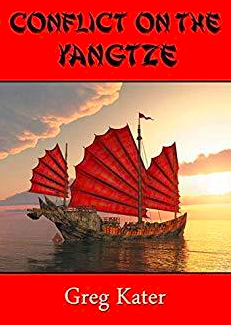
Beyond the end of the Second World War, after the Japanese surrender, the fighting never ceased in China …
This is the fourth historical novel in the Warramunga series by Greg Kater. The events take place during 1946 when former army officer, Jamie Munro, and educated half-aborigine, Jack “Jacko” O’Brien, who head the Commonwealth Investigation Service in Darwin, are asked by Colonel John Cook, a senior commanding officer of MI6, to go to China and assist in the investigation of a drug cartel who are believed responsible for killing one of his operatives along the Yangtze River.During the recent war, Jamie and Jacko had worked in intelligence operations with Colonel Cook during the desert campaign in North Africa, as the Afrika Corps threatened Egypt, and later in South East Asia in the aftermath of war.The pair arrive in Shanghai via Manila in the aftermath of the Japanese occupation with Harry Williams, chief of the US intelligence agency, Office of Strategic Services (OSS), in the Philippines. They had worked with Harry previously in the Philippines on a case involving child smuggling (The Warramunga’s Aftermath of War). They are met at Shanghai’s Bund Docks by Johnny and Lee Drake, a half-Chinese MI6 operative who had lived in Shanghai, posing as a tea merchant, throughout the war. Jamie and Jacko learn that the current state of affairs in China is very complicated. They not only have to contend with the drug cartel but also with gangs, warlords and corrupt personages of influence. They are told the opium produced by the drug cartel is shipped to the Philippines for treatment and from there to the USA and Australia. To reach the centre of the opium operations it is necessary to travel hundreds of miles in a motorised junk up the Yangtze River where hostile, trigger-happy gangs and groups inhabit the riverbanks.

“We’re trying to track down the people behind a major opium-smuggling operation in China…”
Opium is flooding into the USA and Australia. The only way to stop it is to find the source and put the drug cartel out of operation.
However, that is easier said than done.
MI6 agent, Commander Daniel Stafford, has been ruthlessly murdered amongst large bulbs of the poppy seed pods in a field in China. With so much money at stake, the cartel will do anything to continue its operations.
MI6 realise that they cannot thwart this operation alone. They approach the Australian Commonwealth Investigation Service (CIS). Jamie Munro and his esteemed colleague, Jack “Jacko” O’Brien from the CIS head to China to help with the investigation and to try to put an end to the cartel.
However, it soon becomes evident that the drug cartel has friends in very high places. Which begs the question, who do you trust when you can’t trust anyone?
From the poppy fields along the Yangtze River in China to the splendour of the Roper River in Australia, Conflict on the Yangtze, by Greg Kater is the truly gripping account of an opium cartel and those who are determined to stop it.
I was delighted when I discovered that there was a sequel to The Warramunga Trilogy. Having thoroughly enjoyed the first three books I could not wait to reacquaint myself with Jamie and Jacko. I was hoping for another fabulous adventure, and I am pleased to say that Kater did not disappoint.
As with all the books in this series, Kater has an eye for what is entertaining which is then backed up by confident historical research. He has painted a dazzling portrait of not only the dangers along the Yangtze River but also the instability in China during this era. The corruption and the struggle for power are all touched upon within the pages of this remarkable book.
As before, I adored the characterisation of Jamie and Jacko. Both are worthy protagonists in this tale, and more importantly, they are especially likeable ones. They are two very different people, but they work so well together — although there was one terrible moment when I feared that the duo might have run out of luck! A special mention must also go to Jacko’s sister Sarah. Sarah is intelligent, witty and courageous. Her character really helped to drive this story forward.
There are several antagonists in this book, all of whom were fabulously portrayed. Through Kater’s compelling narrative we are offered a glimpse into both worlds — so we see first-hand what the antagonists’ plans are. Unlike the CIS, MI6, and their colleagues, the drug cartel is just as likely to turn on their own men as to plot to murder those who are trying to stop their vile deeds. I thought showing both sides of the story gives the reader a clear understanding of what Jamie and Jacko are up against. It also made this novel next to impossible to put down.
Although this is the fourth book in an incredibly gripping series, Conflict on the Yangtze works very well as a standalone. However, to get the most out of this series, I do suggest you start with book 1 — The Warramunga’s War. You won’t be disappointed.
I Highly Recommend.
Review by Mary Anne Yarde.The Coffee Pot Book Club.
Pick up your copy ofConflict on the YangtzeAmazon UK • Amazon US
Greg Kater
 Greg Kater is an Australian-based author. He lives in Sanctuary Cove, Gold Coast, Queensland and has recently retired from a 55-year international career in the resources industry. The Warramunga’s War is his first work of fiction. He has since written and published two more books, The Warramunga’s Aftermath of War and Skills of the Warramunga, altogether comprising a trilogy.The principal fictional characters interact with actual historical figures and events which have been rigorously researched. The subject of the novel is partly inspired by the experiences of the author’s father during the war in the Middle East, and partly by his own experiences in northern Australia where he worked extensively throughout the Northern Territory and the Kimberley.
Greg Kater is an Australian-based author. He lives in Sanctuary Cove, Gold Coast, Queensland and has recently retired from a 55-year international career in the resources industry. The Warramunga’s War is his first work of fiction. He has since written and published two more books, The Warramunga’s Aftermath of War and Skills of the Warramunga, altogether comprising a trilogy.The principal fictional characters interact with actual historical figures and events which have been rigorously researched. The subject of the novel is partly inspired by the experiences of the author’s father during the war in the Middle East, and partly by his own experiences in northern Australia where he worked extensively throughout the Northern Territory and the Kimberley.Connect with Greg: Website • Amazon Author Page • Facebook • Twitter • Goodreads.
Published on May 05, 2019 21:30
May 2, 2019
Join #HistoricalRomance author, Penny Hampson, as she takes a look at The Art of Deception during the #Napoleonic Wars @penny_hampson
The Art of DeceptionBy Penny Hampson
I’ve written before about espionage and its importance during the Napoleonic Wars. A vital component of espionage was the ability to fool one’s enemies. It has been said that, up to the late 19th century, many military commanders failed to realise the importance of intelligence gathering because its very collection was limited by the primitive communications technology available — in other words, by the time commanders received information on enemy movements, it was usually too late to do anything.
The Duke of Wellington of course was the exception to this rule — he understood that intelligence gathering was paramount.
 Arthur Wellesley, 1st Duke of WellingtonHe made full use of the civilian network of agents originally set up in Portugal by the British Ambassador Charles Stuart, and in addition established a military network of intelligence officers.Wellington knew that he needed to understand the enemy as thoroughly as possible so that he could predict their actions, something that he had learned earlier in his career in India, where he had set up three separate departments for intelligence work.
Arthur Wellesley, 1st Duke of WellingtonHe made full use of the civilian network of agents originally set up in Portugal by the British Ambassador Charles Stuart, and in addition established a military network of intelligence officers.Wellington knew that he needed to understand the enemy as thoroughly as possible so that he could predict their actions, something that he had learned earlier in his career in India, where he had set up three separate departments for intelligence work. There were good reasons for setting up the three departments — information brought in by a spy in one unit could be corroborated or denied by agents in the other units, making it difficult for a commander to be misled by false information. Native military spies in each unit were kept apart and did not know the identities of the agents in other units. They were well rewarded for their skills, but severely punished if the information they provided proved false.
One important aspect of intelligence that Wellington took to heart was the need for secrecy. Very little was committed to paper and Wellington insisted on overseeing everything. A climate of secrecy prevailed at his headquarters, with officers often not knowing of plans until the actual day they were to be implemented. In this way Wellington ensured that very little information on his campaign movements reached the enemy.
Wellington also knew that deceiving the enemy was as important as intelligence gathering. The construction of the Lines of Torres Vedras in Portugal was kept a secret from the French, and according to one historian, scarcely any one in the British army knew of their existence. Wily Wellington had a plan.
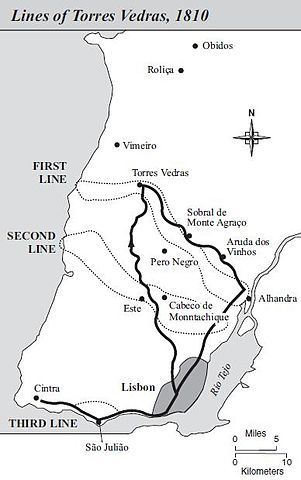
After his victory at the Battle of Buçaco (Bussaco) on 27th September 1810, when he had successfully repelled the attempts of Marshal Masséna, to take that ridge, Wellington did something surprising. On the night of the 28th, he instructed his army to depart from the ridge and head south. Even Wellington’s own troops could not fathom his purpose and the reason for this retreat.
The local populace were also instructed to depart for the safety of Lisbon, and the land was laid waste in their wake. But, as I mentioned earlier, Wellington had a plan.
Tempted by this seeming retreat, and convinced that Wellington could be defeated, Marshall Masséna, the French commander, and his troops followed, eager for victory. Instead they discovered what had been kept secret for so long — the Lines of Torres Vedras.
Between November 1809 and September 1810 military engineers and local labour had worked hard to transform the landscape. Earthworks were constructed on every ridge and now held forts and guns. Forests, orchards, olive groves, and buildings, had been levelled to the ground, denying any cover to attackers. In places, streams and rivers had been dammed to flood the ground, making it impassable, and sections of hillside were blasted away to leave sheer precipices. ‘Every pass had been barred, every roadway transformed into a deathtrap… a broken range of hills had been transformed into an impregnable barrier.’All Wellington had to do was wait.
Masséna, in his eagerness to defeat the British, had fatally allowed his own lines of support and communication to become over-stretched. Moreover, his army was unable to live off the land for an extended siege of the Lines, because of Wellington’s previous policy of scorching the earth. The French army was defeated not by military action but by disease and starvation. One month after making a single and futile attack, Masséna withdrew his forces. Wellington and his army were safe for the winter.
Now Wellington wasn’t the only commander to employ deception in order to fool the enemy. There were commanders at sea who were just as wily. One such was Captain, later Admiral, Lord Thomas Cochrane (1775-1860), who, when he was only a frigate commander was given the nickname ‘Le Loup des mers’ (the Sea Wolf), by Napoleon himself.
 Admiral, Lord Thomas Cochrane.
Admiral, Lord Thomas Cochrane.Attacking French coastal batteries, trading vessels, and signal stations, he would ensure that French signal books were also taken. To convince the enemy that the signal books had been destroyed in attacks he would leave half-burnt papers scattered about. Believing their codes to be safe as the signal books seemed to have been destroyed, the French did not go to the trouble of changing their codes, and so any subsequent messages they sent were no longer secret.
Another tactic employed by Cochrane was to disguise his ship. He knew the French had circulated a description of his vessel Speedy, so he had it painted to imitate another ship, Clomer, a Danish brig, known for trading up and down the Spanish Mediterranean cost. He also employed a Danish speaking quartermaster and equipped him with a Danish officer’s uniform to complete the deception.

Of course it wasn’t just the British who employed these tactics, American naval ships during the War of 1812, would lure British vessels close by disguising themselves as merchantmen.
Cochrane himself was fooled into chasing what he thought was a well-laden merchantman, only to find, when he drew close that it was a Spanish frigate ready to fire its hitherto concealed guns once he was within range.
Another favoured ploy was to hoist flags as if signalling to another allied ship when in sight of an enemy force. The enemy would not know whether there were additional ships just out of sight. Exceptionally brave (or foolhardy) commanders would then turn to face and fight the enemy, giving all the appearance that a supporting fleet was just over the horizon. Many a prudent enemy commander would back down and retreat in these circumstances, not wanting to risk losing their ships.
I cannot omit including two further examples of Cochrane’s ingenuity. Having boarded a much bigger and superior ship, El Gamo, with only fifty men, and confronted by more than two hundred Spanish opponents, Cochrane shouted back down to his own nearly empty ship for reinforcements. The Spanish crew, convinced that more men were going to board their vessel, and unwilling to be killed, promptly surrendered.
In 1805, Cochrane came across three French ships of the line which, because of their advanced design were far faster than Cochrane’s own ship Pallas. Managing to evade them until nightfall, helped by foul weather and a very efficient crew, when darkness came, Cochrane ordered a ballasted cask containing a lamp to be set overboard. The French were most upset to discover next morning that they had been following a cask all night while the Pallas had made good its escape. This was a trick Cochrane employed more than once.
In my novel, An Officer’s Vow, deceptions abound. I’d like to tell you more, but like Wellington I believe secrets should only be disclosed to a trusted circle… so you will need to read my book to discover them!
An Officer’s Vow
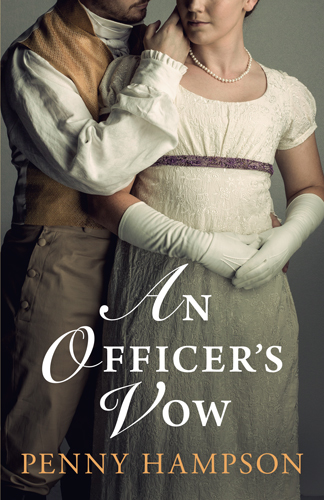
The future looks bleak to Major Nate Crawford. Depressed after being sent home from the Peninsular Campaign as unfit for service, he contemplates ending it all. Then an unexpected opportunity for adventure beckons in the shape of a delightfully intriguing runaway heiress. He will prove his worth as an officer and a gentleman by offering his help. He has a plan…Lottie Benham is desperate. Her life is in danger and she needs a place of safety until her next birthday. The unexpected proposal from this attractive, but intimidating officer could be the answer to her prayers. Not normally a risk-taker, she decides to gamble all by placing her trust in this charismatic gentleman, who she suspects might be more in need of help than she.But the best laid plans…Caught up in conflict, danger, and deception, will Lottie and Nate survive to find the perfect solution to their problems?
Amazon UK • Amazon US
Penny Hampson
 Having worked in various sectors before becoming a full time mum, Penny Hampson decided to follow her passion for history by studying with the Open University. She graduated with honours and went on to complete a post-graduate degree.Penny then landed her dream role, working in an environment where she was surrounded by rare books and historical manuscripts. Flash forward nineteen years, and the opportunity came along to indulge her other main passion – writing historical fiction. Encouraged by friends and family, three years later Penny published her debut novel A Gentleman’s Promise.Penny lives with her family in Oxfordshire, and when she is not writing, she enjoys reading, walking, swimming, and the odd gin and tonic (not all at the same time).
Having worked in various sectors before becoming a full time mum, Penny Hampson decided to follow her passion for history by studying with the Open University. She graduated with honours and went on to complete a post-graduate degree.Penny then landed her dream role, working in an environment where she was surrounded by rare books and historical manuscripts. Flash forward nineteen years, and the opportunity came along to indulge her other main passion – writing historical fiction. Encouraged by friends and family, three years later Penny published her debut novel A Gentleman’s Promise.Penny lives with her family in Oxfordshire, and when she is not writing, she enjoys reading, walking, swimming, and the odd gin and tonic (not all at the same time).Connect with Penny: Website • Twitter
Published on May 02, 2019 23:00
The Coffee Pot Book Club
The Coffee Pot Book Club (formally Myths, Legends, Books, and Coffee Pots) was founded in 2015. Our goal was to create a platform that would help Historical Fiction, Historical Romance and Historical
The Coffee Pot Book Club (formally Myths, Legends, Books, and Coffee Pots) was founded in 2015. Our goal was to create a platform that would help Historical Fiction, Historical Romance and Historical Fantasy authors promote their books and find that sometimes elusive audience. The Coffee Pot Book Club soon became the place for readers to meet new authors (both traditionally published and independently) and discover their fabulous books.
...more
...more
- Mary Anne Yarde's profile
- 159 followers



